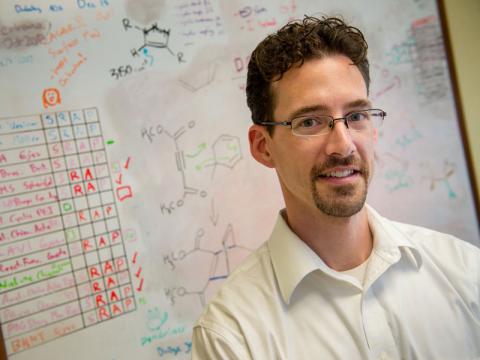
Office
4073A Percival Stern Building
Education & Affiliations
Biography
Affiliations:
- Bioinnovation
- PolyRMC
Areas of current interest:
Macromolecular Architecture
The primary focus of the group involves control of nanoscale architecture through synthetic chemistry, focusing on tailoring nanomaterials towards application to real world problems. This can be carried out using a number of preparative tools, including traditional organic synthesis, polymer chemistry, dendrimer chemistry, and self-assembly—and most often a combination of two or more.
Material Applications
After decades of optimizing “top down” photolithographic patterning of polymer films for production of microelectronic devices, the existing process appears to be reaching fundamental limits. The ability to build structures in a “bottom up” fashion offers an attractive alternative to lithographic approaches but remains largely unexplored. By controlling the assembly of nanoscale materials through mechanisms such as DNA binding, hydrophobic/hydrophilic interactions, and electrostatic attraction, we hope to investigate new methodologies for building defined architectures on the 1-50 nm length scale. Incorporation of functional materials, such as organic conductors, nanocrystals, nanowires, and nantubes represent the long term goal for useful materials.
Medical Applications
The ability to control materials' nano-architecture also represents a useful tool for medical applications. For example, recent work has demonstrated that polymer drug conjugates offer selective uptake into cancer tissues offering a powerful passive targeting mechanism to greatly enhance the efficacy of drugs in cancer therapy. Similarly it is expected that the study and optimization of tailored macromolecules will yield useful vectors for a wide variety of medical treatments including gene, vaccine and drug delivery. Through collaborations with the Tulane medical school, nanomaterials will be designed, synthesized, and tested, in order to optimize their structure and probe their biological properties.
Discipline
Organic, Materials and Biochemistry
